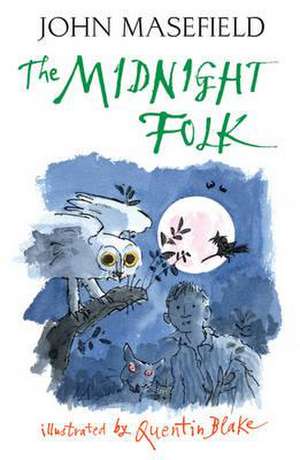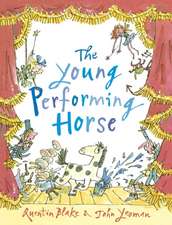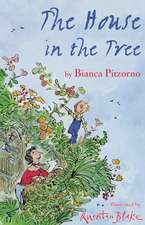The Midnight Folk
Autor John Masefield Ilustrat de Quentin Blakeen Limba Engleză Paperback – 27 iun 2012
| Toate formatele și edițiile | Preț | Express |
|---|---|---|
| Paperback (1) | 57.68 lei 22-36 zile | +10.08 lei 5-11 zile |
| HarperCollins Publishers – 27 iun 2012 | 57.68 lei 22-36 zile | +10.08 lei 5-11 zile |
| Hardback (1) | 106.24 lei 22-36 zile | |
| NEW YORK REVIEW OF BOOKS – 31 aug 2008 | 106.24 lei 22-36 zile |
Preț: 57.68 lei
Nou
Puncte Express: 87
Preț estimativ în valută:
11.04€ • 11.66$ • 9.19£
11.04€ • 11.66$ • 9.19£
Carte disponibilă
Livrare economică 23 decembrie 24 - 06 ianuarie 25
Livrare express 06-12 decembrie pentru 20.07 lei
Preluare comenzi: 021 569.72.76
Specificații
ISBN-13: 9781405210126
ISBN-10: 1405210125
Pagini: 304
Ilustrații: illustrations
Dimensiuni: 126 x 198 x 25 mm
Greutate: 0.25 kg
Ediția:2 ed
Editura: HarperCollins Publishers
ISBN-10: 1405210125
Pagini: 304
Ilustrații: illustrations
Dimensiuni: 126 x 198 x 25 mm
Greutate: 0.25 kg
Ediția:2 ed
Editura: HarperCollins Publishers
Notă biografică
John Masefield (1878-1967) was born in Herefordshire, England. After being orphaned at an early age, he was sent to sea aboard the school-ship HMS Conway in preparation for a naval career. Masefield’s apprenticeship was disastrous—he was classified as a Distressed British Seaman after a voyage around Cape Horn—and he soon left the ship. Arrangements were then made for him to join another ship in New York. But Masefield had other plans: he deserted ship vowing “to be a writer, come what might.”
At seventeen Masefield was living as a vagrant in America. He found work as a bar hand but eventually secured employment at a carpet factory. Thinking that journalism might allow him to write for a living, Masefield returned to England in 1897.
Masefield’s first volume of oetry, Salt-Water Ballads, was published in 1902, however, it was not until the publication of The Everlasting Mercy in 1911 that he made his mark on the literary scene. The success of his second book was followed by the publication of several long narrative poems, including Dauber (1914) and Reynard the Fox (1919).
With the outbreak of the war, Masefield became an orderly at a hospital in France. He also took charge of a motorboat ambulance service at Gallipoli in 1915. After the Allied failure there, Masefield visited America and undertook a series of lectures in support of the war effort. IN 1930 he was appointed Poet Laureate, and five years later the much-loved Masefield was awarded the Order of Merit. He died on May 12, 1967, and his ashes were interred in Poets’ Corner, Westminster Abbey.
The two Kay Harker books, The Midnight Folk (1927) and The Box of Delights (1935), are Masefield’s lasting contribution to children’s fantasy literature. The Box of Delights is now an established Christmas favourite and as much a part of the season as Dickens’s A Christmas Carol.
Madeleine L'Engle (1918–2007) was an American writer best known for her Young Adult fiction, particularly the Newbery Medal-winning A Wrinkle in Time and its sequels A Wind in the Door, A Swiftly Tilting Planet, Many Waters, and An Acceptable Time.
At seventeen Masefield was living as a vagrant in America. He found work as a bar hand but eventually secured employment at a carpet factory. Thinking that journalism might allow him to write for a living, Masefield returned to England in 1897.
Masefield’s first volume of oetry, Salt-Water Ballads, was published in 1902, however, it was not until the publication of The Everlasting Mercy in 1911 that he made his mark on the literary scene. The success of his second book was followed by the publication of several long narrative poems, including Dauber (1914) and Reynard the Fox (1919).
With the outbreak of the war, Masefield became an orderly at a hospital in France. He also took charge of a motorboat ambulance service at Gallipoli in 1915. After the Allied failure there, Masefield visited America and undertook a series of lectures in support of the war effort. IN 1930 he was appointed Poet Laureate, and five years later the much-loved Masefield was awarded the Order of Merit. He died on May 12, 1967, and his ashes were interred in Poets’ Corner, Westminster Abbey.
The two Kay Harker books, The Midnight Folk (1927) and The Box of Delights (1935), are Masefield’s lasting contribution to children’s fantasy literature. The Box of Delights is now an established Christmas favourite and as much a part of the season as Dickens’s A Christmas Carol.
Madeleine L'Engle (1918–2007) was an American writer best known for her Young Adult fiction, particularly the Newbery Medal-winning A Wrinkle in Time and its sequels A Wind in the Door, A Swiftly Tilting Planet, Many Waters, and An Acceptable Time.
Recenzii
In its playful inventiveness and eventfulness, this fantasy is the grandparent of Mary Poppins, of Joan Aiken's Dido Twite books, and even of Eleanor Farjeon's short story collections...Names such as Brassy Cop, Pimply Whatto and young Roper Bilges - or Sir Hassle Gassle - can still amuse, even after 80 years, and there are only a few moments when attitudes grate on modern sensibilities. Hilder's black and white illustrations, from the 1930s, hark back to the era of 19th century boys' adventure stories. They also give the book added spice." --The Toronto Star
“Mr. Masefield has written the sort of book that grown-up people like to give a child for Christmas, and then enjoy reading for themselves. The Midnight Folk is a story to be read aloud in the traditional Winter fireside setting….The style is imaginative and glamorous…Children will like to hear their elders read the tale.” –The New York Times
“John Masefield's much-loved 1920s children's book about a boy who must fight dark magic to uncover his family's treasure. It won't be easy, but luckily he has an owl, a fox, a cat and a box of toys to help him on his way.” –The Guardian (London)
“An imaginative and adventurous tale.” –The New York Times
“Masefield the children’s writers is unbeatable… The Midnight Folk is a truly remarkable book.” –Daily Telegraph (London)
A “charming tale…Pirates and buried treasure, smugglers and witches, mermaids and an ancient wrong, all have parts in this story of the small boy who had friends among the animals, and lived a life of adventure when he was supposed to be asleep.” –The Bookman
“There is a little boy for hero, there are witches, a good deal of excellent magic, a hidden treasure, and a profusion of talking animals and toys come to life…It may be added that anyone who has, in infancy, greatly disliked his governess will derive a special gratification from The Midnight Folk.” –The Living Age (London)
“Mr. Masefield has written the sort of book that grown-up people like to give a child for Christmas, and then enjoy reading for themselves. The Midnight Folk is a story to be read aloud in the traditional Winter fireside setting….The style is imaginative and glamorous…Children will like to hear their elders read the tale.” –The New York Times
“John Masefield's much-loved 1920s children's book about a boy who must fight dark magic to uncover his family's treasure. It won't be easy, but luckily he has an owl, a fox, a cat and a box of toys to help him on his way.” –The Guardian (London)
“An imaginative and adventurous tale.” –The New York Times
“Masefield the children’s writers is unbeatable… The Midnight Folk is a truly remarkable book.” –Daily Telegraph (London)
A “charming tale…Pirates and buried treasure, smugglers and witches, mermaids and an ancient wrong, all have parts in this story of the small boy who had friends among the animals, and lived a life of adventure when he was supposed to be asleep.” –The Bookman
“There is a little boy for hero, there are witches, a good deal of excellent magic, a hidden treasure, and a profusion of talking animals and toys come to life…It may be added that anyone who has, in infancy, greatly disliked his governess will derive a special gratification from The Midnight Folk.” –The Living Age (London)



